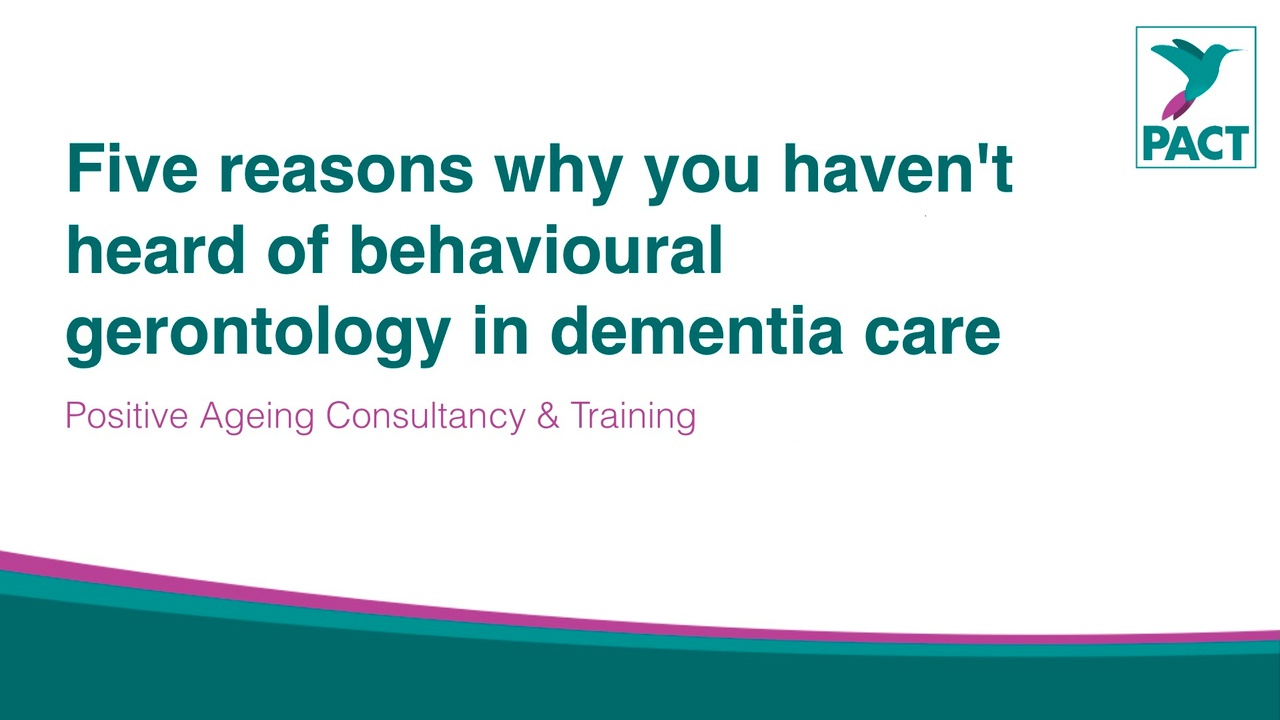Five reasons why you haven't heard of behavioural gerontology in dementia care
Jul 09, 2021
We are board certified behaviour analysts who provide bespoke support based on the science of behavioural gerontology. But, you probably have never heard of behavioural gerontology before, despite the evidence for its effectiveness across the last 50 years. In this blog we want to cover five reasons why we think you have probably never heard of behavioural gerontology and give you some more insight into what it is!
1. Buzz words from behavioural gerontology have made it into mainstream dementia care
When we are looking at supporting people with dementia with distressing behaviour, the evidence and guidelines all point towards function based interventions being the best course of action. Sometimes the terms used are environmental approaches, or looking for unmet needs or considering the context. All of the interventions that fall under these terms are originally based on behavioural gerontology. But, in our experience, not every service that is marketed under these names is actually based on the underlying science like behavioural gerontology- there are many people offering services using these buzzwords, but without having ever had any training in the underlying science!
Similarly, many guidelines expect carers or family members to be able to analyse and provide a function based assessment and intervention without any training either! To expect a non-behavioural professional to deliver these interventions discounts the decades of research looking at functions of behaviour in human beings and the advanced training that is needed to understand the full complexity of human behaviour. Having completed over 12 years of higher education University training and years of supervised clinical work between us, we know that proper behavioural support isn’t something you can pick up in a day course or even few weeks training.
2. There are almost no professionals in the UK trained in behavioural gerontology
Behavioural gerontology is actually a sub-field of the science of human behaviour (called applied behaviour analysis). Behaviour analysts can work with any humans in any setting- there are behaviour analysts working with elite gymnastics, with people in business management, in prison services and with people with learning disabilities. As experts in behaviour change and learning, our science can be applied to wherever people need support. However, historically, work with older adults was not seen as an exciting area and all the funding went into autism services. Over the last few decades, ABA therapy (and a derivative of this science, PBS) has taken off exponentially in autism and disabilities services. This means that the funding streams and jobs are in autism and new behaviour analysts don’ realise they can work in older adult services.
Of the nearly 300 behaviour analysts listed on the UK-SBA professional register, we are only aware of less than 1% who work with older adults. Similarly, of the more than 48,000 board certified behaviour analysts working across the world, less than 0.2% work with older adults. This means that although the science is there to help us provide meaningful and effective behaviour support, there are almost no professionals trained to actually deliver it.

3. Behavioural gerontology is a science, not one form of therapy.
Board certified behaviour analysts know from both their advanced training and their professional experience that no two humans are alike. We all have completely unique lives and experience events and relationships differently to every other person on the planet. That means that interventions to resolve behavioural issues have to be as unique as the people who are experiencing them. Two people with the same behaviour even with other similar characteristics will need completely different supports. Support based on behavioural gerontology is not one form of therapy- it looks entirely different in every case because it’s about using scientific methods to understand that specific person and their situation, and design a unique solution, not about trying to sell a one-size fits all approach.
The foundational principles of behavioural gerontology come from the broader science of behaviour analysis, and the evidence base has been growing consistently for over 60 years. These principles apply to all humans, not just those with dementia (like the basic understanding of how our organs work applies to all humans, not just those with heart failure), so often this evidence is overlooked because it is not specific to people with dementia. Sadly, we see a lot of misconceptions and myths repeated about our science even from well-respected and well-educated dementia researchers.
4. Behavioural Gerontology studies are often excluded from large literature reviews
This one gets a bit technical but bear with me here! Because behavioural gerontology is the application of scientific principles, not a one-size fits all therapy, it is often missed out of large literature reviews of the evidence. If you were to ask the question “does behavioural gerontology work?” its similar to asing “does medicine work?” Well, yes, but there’s no scientific paper showing that medicine works, you need to ask more specific questions such as (to continue the analogy) “does ventolin work for symptoms of asthma?” In a behavioural approach, that might be asking something like “does differential reinforcement work for aggressive behaviour?”
Behaviour analysts even go one further than this. Because we know that every human is unique, and every behaviour happens for a reason that is completely unique to each person, when we publish research, we publish individual data, not big group data. Our research questions are more along the lines of “does differential reinforcement work for Mrs Smith who lives in Vale Care home and is engaging in aggressive behaviour to communicate her need for support?” This doesn’t mean that the data we publish is of less value- in fact our data is often much richer (more data points) than averaged data, but we do more replications. So, whereas other researchers looking at a one-size-fits all therapy, might do one study with 50 participants and have 2 data points for each participant, we would do 25 studies with 2 participants each and have 30 data points for each participant. Over time we build up a picture of when particular applications of behavioural principles work, for what kind of participants, under what types of circumstances. Sadly, due to the frequent misunderstanding of this kind of research (often mistaking it for case studies or dismissing it because we don’t manipulate the data), the research is often overlooked or excluded from large reviews.

5. It isn’t a quick fix, it isn’t cheap and it isn’t fashionable
We all would love a cure for dementia- a drug or even a therapy that will bring our loved ones and clients back to their former selves. While the research is still ongoing to develop a cure, there are many people out there who deserve high quality evidence-based support with their behaviour. There are lots of very fashionable, snazzy new therapies that claim to work miracles in almost no time at all for older adults. Behavioural gerontology is different. We aren’t claiming its easy, we’re not claiming we can cure dementia or bring your loved one back, we aren’t claiming to be a quick fix. Our interventions are always designed to be practical and do-able, but changing behaviour is hard work and our bespoke assessments and interventions usually take weeks or months. This means that it also isn’t cheap- to hire someone who has advanced qualifications and certifications and many years of experience for many hours isn’t free. We try to make it easier for budgeting by using a flat rate so there’s no surprises or low quality services if you can’t afford more.
Here at PACT, we think it’s time for a change, and that older adults in the UK deserve high-quality and evidence based behavioural support. We know that we are just at the start, but we hope to bring behavioral gerontology to more people in the UK. In our University affiliated work, we found that carers really appreciated the work we did and their clients benefitted hugely. We want to roll this service out privately to begin with, but our aim is and will always be to have our services provided through state funding long term. As part of our mission, we want to let more people know about the science behind our work. Carers should be informed about their choices and have access to scientific evidence.
If you are interested in reading more about behavioural gerontology, click here.

